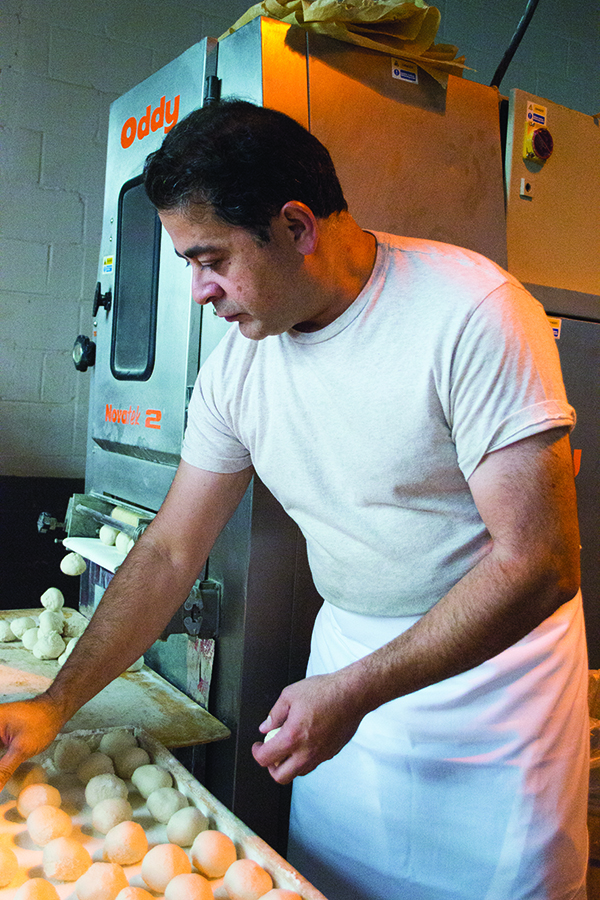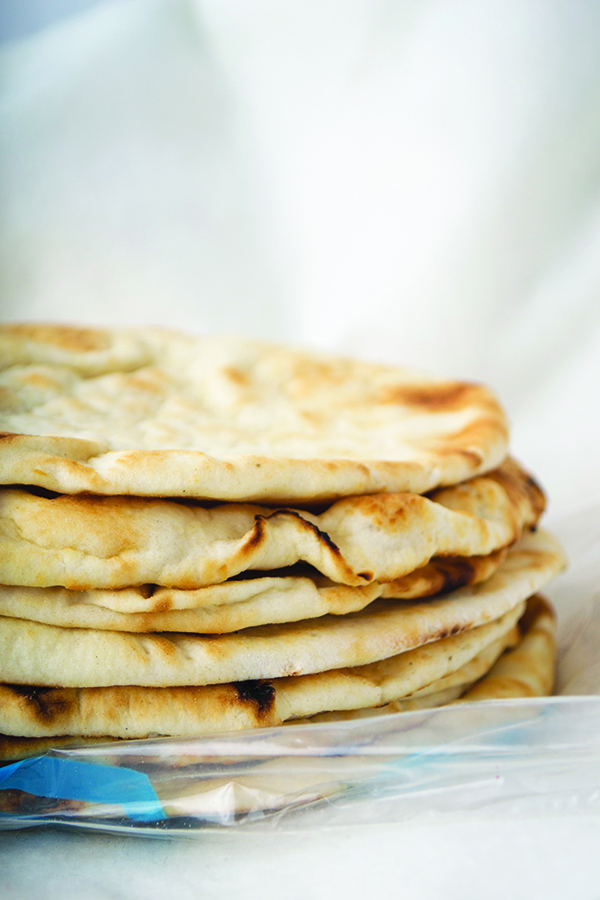Sweet as Sweis
Friday, October 6, 2017

The conveyor belt slowly rolls from the 560-degree oven as the round, flat bread falls onto the next belt to head for packaging. The room, heated from the oven, smells like flour, yeast and warm bread. A large mixer sits in the corner, and 50-pound bags of flour rest in a stack on the floor, ready to be used.
Joel Sweis makes two types of pita bread in his family’s bakery. Prompted by their Mediterranean heritage, Sweis and his five older brothers came to Oklahoma City from Chicago in 1976 to start a family restaurant serving American and Mediterranean food.
“When my brothers arrived in Oklahoma from Chicago, they realized there were no gyros, so they went back to Chicago to find a recipe to make them,” Sweis said. “Gyros are a Greek sandwich with pita bread and usually lamb or a combination of beef and lamb.”
The pita bakery opened in 1979 and has remained in the family ever since. Sweis said making the flat and pita breads his bakery produces is simple because both products require few ingredients.
“I am not really sure how far back it goes in my family of teaching the younger generation to make bread,” Sweis said. “All I know is that it was passed down through the Bible because people have been baking bread for more than 5,000 years. It is just salt, flour, water and yeast.”
In European and Middle Eastern countries, Sweis said bread is a staple for meals and people buy bread for daily use. He said he was surprised no one in Oklahoma was making pita bread, but he realized bread has to have a longer shelf life in the United States because sometimes it may travel for a few days in a truck and then sit in the back of the store for additional days before it is put on the shelves.
Sweis said pita bread gets hard quickly and he wanted to extend the shelf life of the pita bread by slowing the hardening.
“I heard good things about Oklahoma State University helping small business owners like myself with their business plan, products and marketing,” Sweis said.
Sweis said he started working with the OSU Robert M. Kerr Food and Agricultural Products Center last May. He knew he had to improve or get out of the business because he wasn’t making any progress, he said.
“I couldn’t just keep chugging along,” Sweis said. “I knew I needed to make a change, and as a small-business owner, you have to do everything. OSU was the best option for help.”
He went to FAPC to find an ingredient to allow the bread to be on the shelf for more than a day or two as well as remain soft, he said.
“Joel uses a long-time family recipe, and those recipes usually don’t have mold inhibitors like grocery store products,” said Renee Nelson, milling and baking specialist at FAPC.
Nelson said she gave Sweis many options for additives to help with the shelf life. She said he wanted something to keep the bread soft that did not add fat or oil to the recipe.
“I chose calcium propionate for my recipe,” Sweis said. “It is less than 1 percent of the recipe. Each batch of pita bread has 100 pounds of flour and makes 1,000 pitas, so 1 percent isn’t much at all, but it makes all the difference.”
Sweis’ new bread recipe will allow the product to last two weeks on the shelf without freezing. Sweis said he learned from Nelson how refrigeration will speed up staleness. To keep the pita bread fresh for more than two weeks, the pitas need to be frozen, he said.
“FAPC helped me with more than just the formulation,” Sweis said. “I wasn’t confident about the quality of my bread, but now I am 100 percent sure it is a great product. FAPC helped me be confident with the bread recipe because I knew it would last longer, and then they helped improve marketing.”
While Sweis was working with FAPC, he also met with Andrea Graves, business planning and marketing specialist at FAPC. She helps manage projects and finds specialists who are right for each specific job involved with the project.
“I was excited to work with Sweis Pita Bakery,” Graves said. “I never would have guessed that we had pita bread in Oklahoma, and I like to see people succeed, especially small companies.”
FAPC helped develop new, more appealing packaging for Sweis’ products, Graves said. The packaging had more directions for pita bread use and was eye-catching for the consumer. Although the design is complete, FAPC is still looking for a place to print the packages, he said. Now, FAPC is building a website for the bakery.
In addition to operating the bakery, the Sweis family provides bread to the international community and has three restaurants in Oklahoma City: Penn Square Mall, Quail Springs Mall and 201 S. Western Road. The University of Oklahoma campus also has a restaurant that serves Sweis pita bread.
As the bakery moves forward, Sweis said he hopes to get his bread into grocery stores and onto the OSU campus. Sweis said he has seen the market moving toward Mediterranean food mostly because nutritionists are pushing the healthy value.
Bread, olives and cheese are staples to a Mediterranean table, Sweis said. The bakery can provide bread for this new growing trend, which is why he wants to get his bread into grocery stores.
“I would absolutely recommend FAPC to others looking to grow their small business,” Sweis said. “I will always give credit to OSU and FAPC. Their help gave me the confidence to go places and be successful.”

